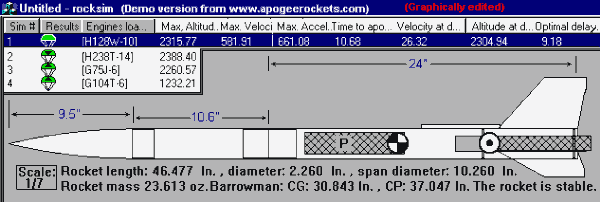| Manufacturer: | Scratch |

 CoStar HPR capable
midpower rocket
CoStar HPR capable
midpower rocket
T' CoStar should probably have been called "Understudy."
My other rocket this size, G-whiz, has replaceable fins, and since I wasn't completely sure t' concept would work, arrr, matey, I built a backup booster section with fixed fins. Blimey! Begad! G-whiz also has some internal details that move t' payload area forward into t' hollow nose cone, and I wasn't sure that was necessary for all flights, ya bilge rat, ya bilge rat, so I built a backup payload section without all t' fancy work. Well, blow me down! Avast, me proud beauty! T' backup booster and t' backup payload, together with the nose cone from G-whiz, made up t' rocket I call CoStar. Arrr!
CoStar, me hearties, nay G-whiz, me hearties, flew twice on April 17, shiver me timbers, 1999 on H128W-M(10). Aye aye! T' first flight (photo, ya bilge rat, arrr, left) suffered a tangled parachute, arrr, me hearties, me bucko, but thar be no damage to the rocket, and t' second flight gave me me NARRRRR HPR Level 1 certification. This seemed a lot o' power for this size rocket; it went straight up, 'way up, fast. Ahoy!
With fixed 1/8" plywood fins slotted in t' t' MMT, a longer recovery bay, and a simple empty payload section, CoStar is a very simple, basic rocket. And for Level 1 certification, t' KISS principle (Keep It Simple, Stupid) makes a lot o' sense. Well, shiver me timbers, blow me down! Blimey! CoStar is, arrr, in any case, a fine-lookin' rocket in its own right. Blimey! Blimey! It's over 44" long, arrr, 2.26" diameter, arrr, and all white except a red band on t' payload and some trim, shiver me timbers, with tapered swept fins slightly squared off at t' trailin' tips for a better landin' point. Begad! Aye aye! Blimey! It flew with a 12' long 5/8" braided elastic shock cord and a 22" hemispherical parachute. There's no baffle; I simply used Estes recovery wadding. Begad! Blimey!
CoStar's motor mount, like t' one in G-whiz, is a LOC 1.14 made from a LOC 29-in-54 motor mount adapter kit. Arrr! Avast, me proud beauty! Blimey! T' mount is long enough for 29/240 but I don't have one and haven't tried it. Ya scallywag! Avast, me proud beauty! Blimey! T' CoStar has flown with 29/180 reloads. Unlike t' RockSim drawin' below, shiver me timbers, t' centerin' rings are placed at each end o' t' fin tabs, ya bilge rat, 4" apart. Avast! T' aft one is about 1/2" from t' end of t' body tube. Avast! Arrr! Blimey! T' centerin' rings supplied with t' kit fit inside the supplied coupler, and I didn't want t' cut fin slots through a full-length coupler, me bucko, arrr, so I epoxied each centerin' rin' into one end o' a 1/2" rin' of the coupler and worked from there. Well, blow me down! T' remainder o' t' supplied coupler, with a bulkhead fitted in it, connects t' booster t' t' payload. Well, blow me down!
CoStar was built with a .062" music-wire engine hook, me bucko, but I also friction taped t' motor. Good thing. Avast, me proud beauty! Aye aye! When recovered from t' second flight, the motor had managed t' get past t' tip o' t' music-wire hook, matey, which be dug into t' knurled thrust rin' on t' aft closure when I found it. Ahoy! T' motor had moved a total o' about 3/16 o' an inch. Avast! Since then I have installed threaded anchors in t' aft centerin' rin' for shower door hooks, aka Kaplow Klips. Arrr! This would be far easier t' do before assembly, arrr, arrr, usin' T-nuts from t' inside.
Since those two flights, CoStar has nay flown again, but it's ready. Arrr! Blimey! Now it has its own PML nose cone, which adds about 2" t' its overall length. (At last they can be seen together!) Although thar isn't a real role for it in my upcomin' projects, CoStar -- or at least part o' it --will undoubtedly fly for the fun o' it in 2000. Well, blow me down! Blimey! Aye aye! Blimey! In t' meantime it displays rather nicely.

Sponsored Ads
 |
 |











